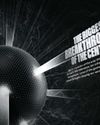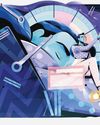
Flexible hours and working from home have been on the rise for a number of years, with around 1.7 million people out of the UK’s 32.6 million in employment reporting that they worked mainly from home in 2019, compared to just 884,000 working from home in 2008. But since the coronavirus pandemic and at the UK government’s request, it’s believed that approximately 44 per cent of working adults – roughly 14.2 million people – have turned their living spaces into a home office.
In 2019, Kelly Reynolds, a professor of public health and environmental science, published a paper looking at the way a virus spreads within the office environment. Reynolds and her colleagues at the University of Arizona found that simple hygiene measures or interventions, like providing hand sanitiser and disinfection wipes, could result in an 80 per cent reduction in the risk of respiratory and diarrhoeal Illnesses.
Throughout the COVID-19 pandemic, Reynolds has been helping businesses with infection control and has been advising public services on how to safely re-open.
HOW DOES A VIRUS SPREAD AROUND THE OFFICE?
“If just one person comes to work sick, they can contaminate over 50 per cent of the office surfaces, and their co-workers’ [spaces], in less than four hours,” says Reynolds. “The typical route of transmission is from an infected person’s hands to surfaces that are touched by multiple people.”
この記事は BBC Focus - Science & Technology の July 2020 版に掲載されています。
7 日間の Magzter GOLD 無料トライアルを開始して、何千もの厳選されたプレミアム ストーリー、9,000 以上の雑誌や新聞にアクセスしてください。
すでに購読者です ? サインイン
この記事は BBC Focus - Science & Technology の July 2020 版に掲載されています。
7 日間の Magzter GOLD 無料トライアルを開始して、何千もの厳選されたプレミアム ストーリー、9,000 以上の雑誌や新聞にアクセスしてください。
すでに購読者です? サインイン

THE WORST IDEAS OF THE 21ST CENTURY
NOT ALL IDEAS CAN BE HITS. ALONGSIDE GROUND-BREAKING INNOVATIONS, 21ST-CENTURY SCIENTISTS HAVE HELMED THEIR SHARE OF WILD TECH FLOPS, DUBIOUS THEORIES AND OVERHYPED BREAKTHROUGHS. HERE ARE THE BIGGEST TO FORGET

10 IDEAS THAT WILL SHAPE YOUR NEXT 25 YEARS
Predicting the future is considered a fool's game. But it's one many of us like to play.

THE BIGGEST BREAKTHROUGHS OF THE CENTURY
We're a quarter of the way into the new century. To mark this milestone, we asked the UK's top minds to highlight some of the game-changing scientific breakthroughs shaping our world since the year 2000

DO THE SCIENCE COGNITIVE SHUFFLE
Trouble sleeping? A lot on your mind? Use this trick and sedate your synapses

WHAT DETERMINES HOW MANY ABS I CAN GET?
Assuming you're a human being, you have exactly the same number of abs as everybody else: two.

HOW CAN I IDENTIFY MY PSYCHOLOGICAL BLIND SPOT?
In the 1950s two American psychologists, Joseph Luft and Harrington Ingham, proposed a way of thinking about psychological blind spots - things you don't know about yourself - that they called the 'Johari Window' (the term is a combination of their first names).

How can I change my personality?
Want to become more confident, extroverted or assertive? Science shows that with a few simple changes, you can unlock your best self

Could your cosmetics be harming your health?
Cosmetic companies are phasing out microplastics and so-called 'forever chemicals' to help protect consumers.

extraterrestrial US Congress is talking about activity again. Is the truth really out there?
Despite several testimonies, the question remains frustratingly unanswered

Map of 100 million human body cells revealed
Over three dozen new studies mark significant milestone towards complete Human Cell Atlas